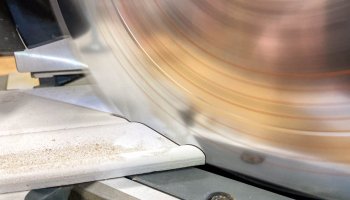
When it comes time for fall lawn maintenance, you might want to consider upgrading your gear. A leaf vacuum is one of the best tools for making yard cleanup easier and more effective. They allow you to vacuum autumn debris off the ground and grind it into compact pieces. Afterward, you can either dispose of it or use it as compost. Leaf vacuums come in various types, including combination blower/vacs, push-behind units, and large tow models for commercial use. Here’s our list of the best leaf vacuums and what you should keep in mind when shopping for one.
Also In This Article
Related Content
How We Picked the Best Leaf Vacuums
We tailored our list of the best leaf vacuums to meet the needs of different-sized jobs and budgets. Our list includes tow-behind models designed for use by professional yard management companies as well as gas-powered walk-behind leaf vacuums and handheld models for pros and homeowners with bigger leaf collection jobs. Our selections also include corded and cordless handheld electric leaf blowers for light-duty leaf removal. In making our selections, we considered such factors as mulch ratio, power, and brand.
Best Overall Leaf Vacuum
Stihl SH 86 C-E Shredder Vac/Blower
One of the frustrations with many leaf vacuums is that they’re easily clogged by twigs, wet leaves, and other debris that’s heavier than the average dry leaf. That’s not the case with this model from Stihl. This professional-grade shredder/blower boasts a 27.2 cc gas engine that produces plenty of debris-chopping power. That means you won’t be slowed down by clogs. And while this machine comes with a steeper price tag than most handheld models, remember that it doubles as a blower, and a powerful one at that. It’s capable of producing an air volume of 444 cubic feet per minute (CFM), putting it among the top handheld leaf blowers out there. Add to that an anti-vibration system and Stihl’s Easy2Start system, and you’ve got the best all-around combination leaf shredder blower on the market.
Key Features
- Powerful 27.2 cc engine
- Doubles as blower
- Anti-vibration system
- Easy start system
Specifications
- Type: Gas Handheld
- Weight: 12.3 lbs.
- Mulch ratio: N/A
Price: $339.99
Best Budget Priced Leaf Vacuum
Black+Decker Electric Leaf Blower/Vacuum BEBL7000
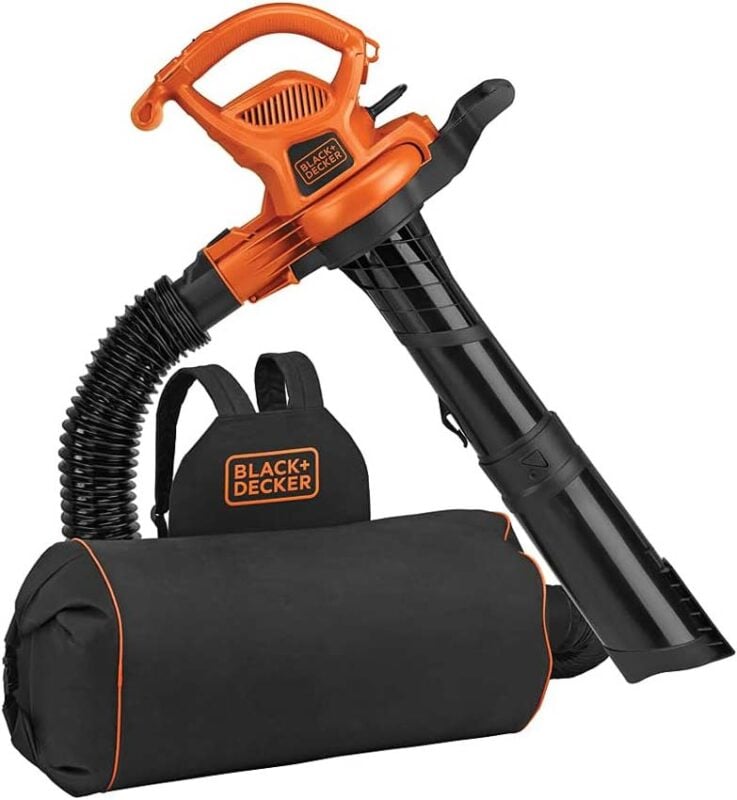
This combination leaf blower and vacuum is a great example of the value you get from Black+Decker’s budget-priced power tools and yard machines. With its power boost function, it produces an impressive 400 CFM air volume and a top speed of 250 MPH. Once you’ve blown the leaves into a pile, you can convert it to vacuum mode, which includes an ergonomic collection bag with backpack-style straps. The corded design limits its range and it lacks the raw power of a gas handheld, but its low price makes it a great alternative to the rake if you only have a smaller area to clear.
Key Features
- Affordably priced
- Powerful for electric blower
- Ergonomic leaf collection bag
Specifications
- Type: Electric handheld
- Weight: 11.1 lbs.
- Mulch ratio: N/A
Price: $89
Best Residential Leaf Vacuum
Stihl SH 56 C-E Shredder Vacuum
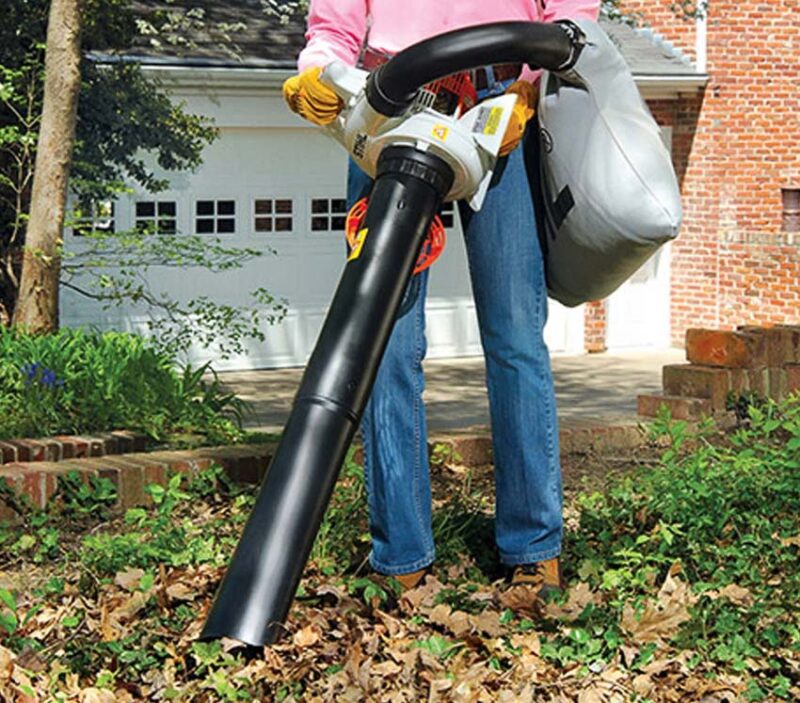
This scaled-down version of Stihl’s SH 86 is ideal for homeowners looking for a machine that can help with their leaf-clearing needs. With its 27.2 cc engine–the same as the SH 86–it’s capable of sucking up and mulching leaves without clogging, even when it encounters damp material or twigs and acorns. That means you’ll spend less time clearing clogs. It also doubles as a formidable blower with 412 CFM and a max air velocity of 159 mph, allowing you to round up leaves before vacuuming them up and mulching them. You also get the user-friendly features of Sithl’s Easy2Start system and ergonomic handle. While it may lack some of the features found on the SH 86 and isn’t quite as powerful, it’s also $100 cheaper, making it the ideal tool for homeowners who have a lot of leaves to clear.
Key Features
- Powerful engine
- Stihl build quality
- Easy start system
Specifications
- Type: Gas handheld
- Weight: 11.5 lbs.
- Mulch ratio: N/A
Price: $269.99
Best Cordless Leaf Vacuum
Greenworks 40V Cordless Brushless 2427802
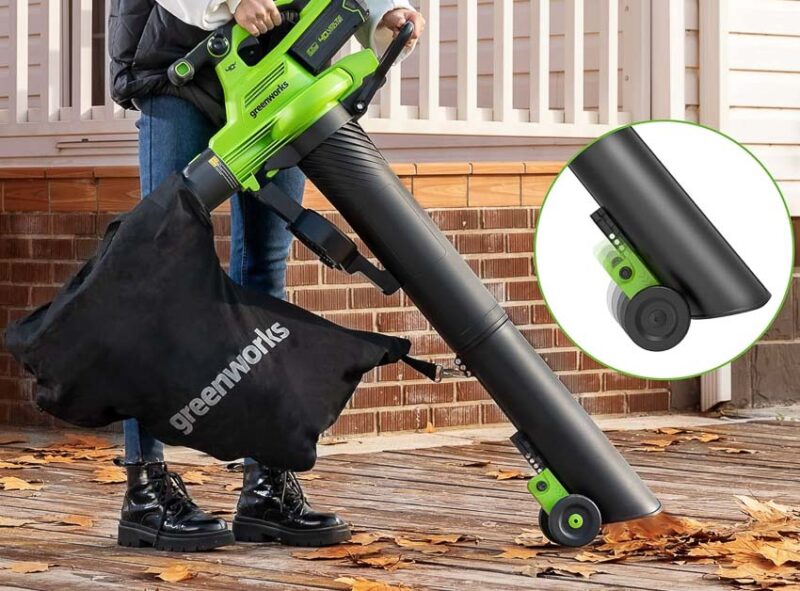
While we wouldn’t recommend any cordless leaf vacuum for managing wet leaves or heavy leaf removal, they are useful for managing light leaf problems in dry conditions. And, as cordless models go, Greenworks makes the best of the bunch. With its brushless motor and 40-volt rechargeable battery, it can produce enough suction to handle dry leaves.
We also like this unit’s design. The suction tube rests on a set of wheels, making it easier to maneuver than those that require you to support their entire weight. And, since it uses an electric motor, it operates at a much quieter 69 decibels than gas models. Its short run time of 15 minutes on a single charge limits how much you can clear with it. But, if you’ve got light to moderate leaf cleanup each fall, the Greenworks combination blower and vacuum is a good choice.
Key Features
- Quiet electric motor
- Wheeled design makes it easier to hold
- Lighter than gas models
Specifications
- Type: Cordless electric
- Weight: 17 lbs.
- Mulch ratio: N/A
Price: $246.65
Best Walk-Behind Leaf Vacuum
DR Power Equipment Pilot XT 173cc Lawn Vacuum WL31004DMN
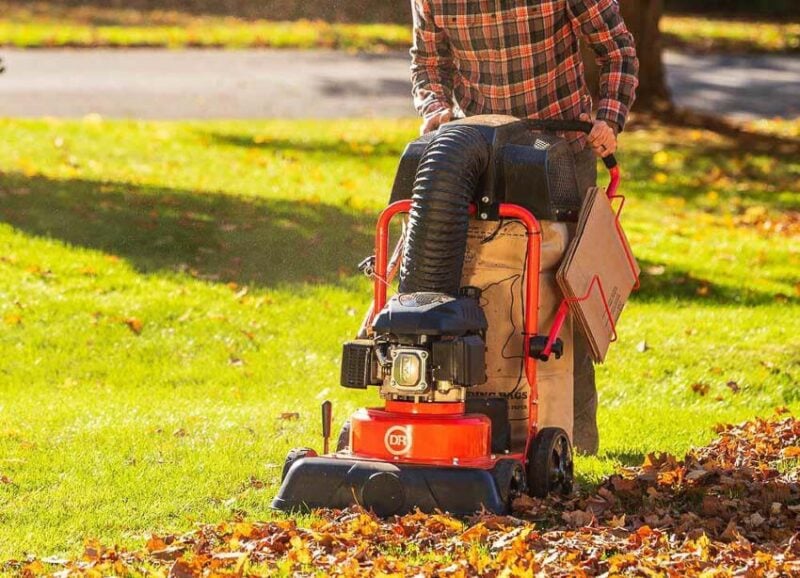
Few machines make the process of collecting leaves for curbside disposal easier than this tool from DR Power Equipment. That’s because it uses a direct bagging system that eliminates the time-consuming and often messy process of transferring the mulched leaves from the collection bag to a waste bag.
The Pilot XT uses a leaf collection system that dumps mulched leaves directly into waste bags that attach to its dispenser. There’s also a quick change system for trading out bags, and it includes a caddy that carries 10 empty bags, further cutting down on the time it takes to switch out loads. And since the collection bags are biodegradable paper, you won’t be adding plastic to your local landfill. If you’re looking for the quickest way to clear leaves from your yard, this is it.
Key Features
- Dispenses leaves directly into waste bags
- Uses biodegradable paper bags
- Can hold up to 50 pounds of leaves per load
- Bag caddie holds empty bags
Specifications
- Type: Gas walk behind
- Weight: 105 lbs.
- Mulch ratio: N/A
Price: $999.99
Best Commercial Leaf Vacuum
DR Pilot 200 Leaf and Lawn Vacuum LL21009DMN
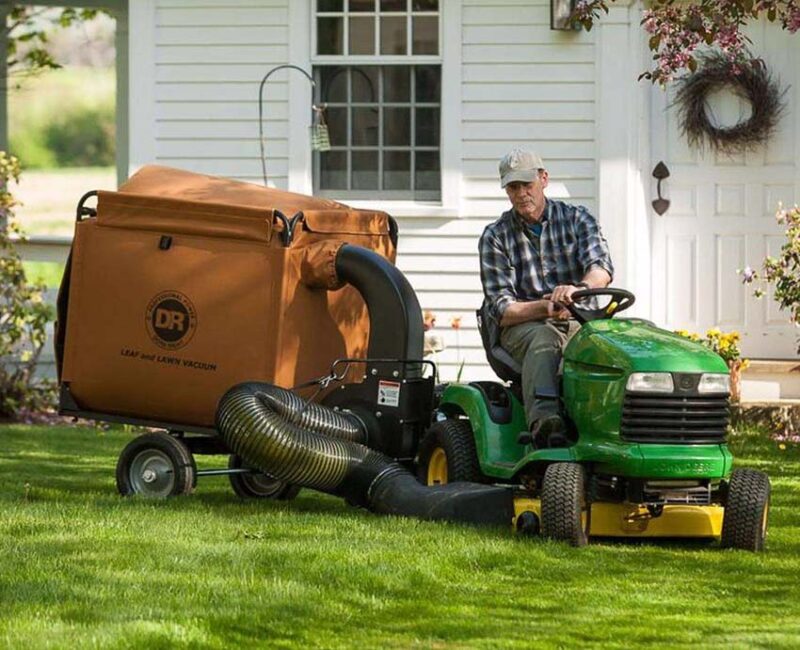
This towable leaf and lawn vacuum can remove a massive amount of leaves, thanks to its ability to break leaves down into very compact material and its huge collection container. The Pilot 200 is powered by a 6.6 horsepower engine that shreds leaves before sending them into a massive 200-gallon collector/trailer that attaches to a standard riding lawn mower. With its two-step mulching process (leaves are cut first by the mower’s blade and again by the mulcher), leaves are broken down into very fine material for composting. Once full, the collection bag tilts backward for easy dumping.
We also like the fact that this trailer-style vacuum is modular, meaning you can break it down for easy storage. You can also use the frame as a flatbed trailer for hauling materials. The Pilot 200 is an investment, but it’s worth it for those who clear leaves for a living.
Key Features
- Tremendous collection capacity
- Cuts leaves down to fine material
- Bed tilts for easy dumping
- Breaks down for storage
Specifications
- Type: Towable
- Weight: 230 lbs.
- Mulch ratio: N/A
Price: $1,499
Best Electric Leaf Vacuum
WORX 12 Amp TRIVAC Electric Leaf Blower and Mulching System WG509
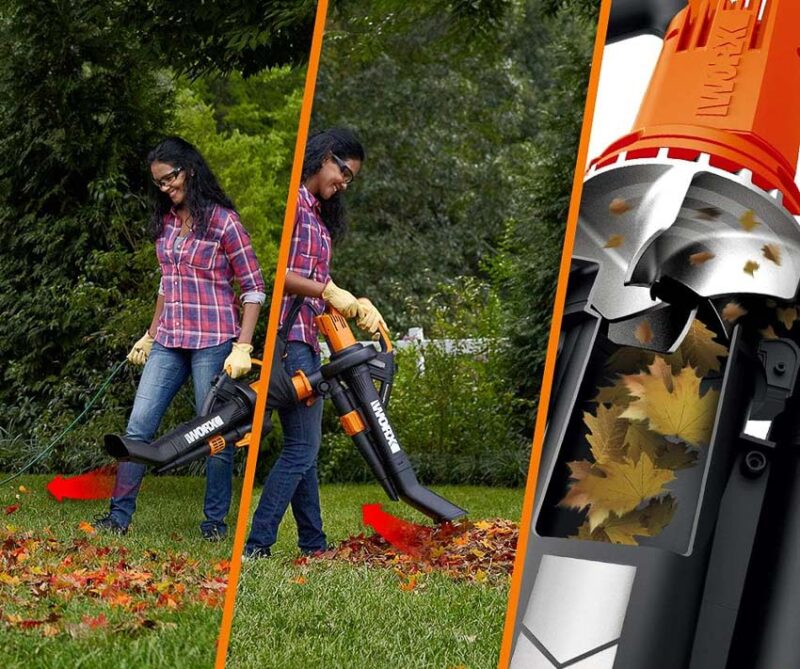
This corded leaf blower runs off of a 12 amp motor and uses a metal impeller that is capable of breaking down leaves into tiny bits with its high 18:1 mulch ratio. We also like the design features that make this tool easier to use. Unlike other combination models, there’s no need to attach and detach tubes to switch from vacuum to blower. Since this model uses two separate tubes for each function, all you need to do is flip a lever.
We also like the curved end of the vacuum, which makes it easier to suck up leaves that are up against the house or stuck up under plantings. And despite its bulky appearance, it’s fairly lightweight at just a hair over 9 lbs. While this combination model isn’t powerful enough to handle bigger leaf-clearing efforts, it’s a smart choice if you have a smaller area to clear.
Key Features
- High mulch ratio
- Converts from vacuum to blower with the flip of a switch
- Lightweight design
- Metal impeller
Specifications
- Type: Corded electric handheld
- Weight: 9.3 lbs.
- Mulch ratio: 18:1
Price: $94.66
Best Gas Leaf Vacuum
Echo 25.4 cc Gas Handheld Leaf Blower Shred N Vac ES-250AA
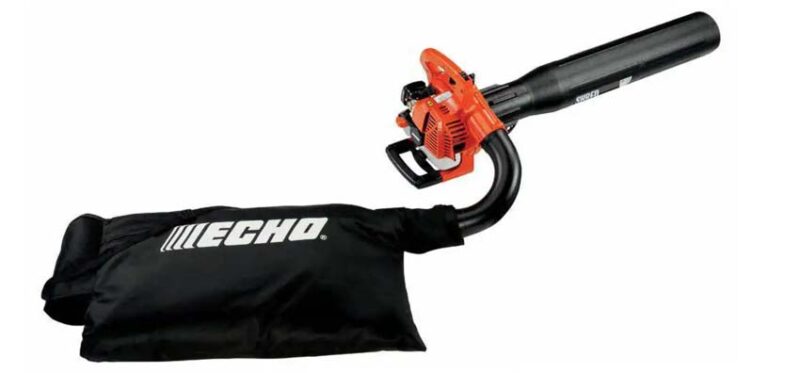
Echo packs a lot of punch into this combination leaf blower and shredder. It’s powered by a 25.4cc engine and has a steel impeller, which means it can chop up tougher materials like damp leaves and twigs.
Furthermore, there are other pro-level features we like about this one, including an electronic ignition that makes it easier to start than other gas-powered units and an anti-vibration system. With its 2-bushel collection bag and a high 12:1 mulch ratio, this leaf vacuum can hold a lot of leaves. It also makes for a respectable blower with a max air volume of 391 CFM and a speed of 165 miles per hour. Echo also keeps its price tag reasonable, giving you pro quality at an affordable price.
Key Features
- Powerful motor and steel impeller
- Large 2-bushel collection bag
- High mulch ratio
- Powerful blower
Specifications
- Type: Gas handheld
- Weight: 12.6 lbs.
- Mulch ratio: 12:1
Price: $249
Best Leaf Vacuum for Large Yards
Troy-Bilt Gas Powered Chipper Shredder Vacuum CSV060B
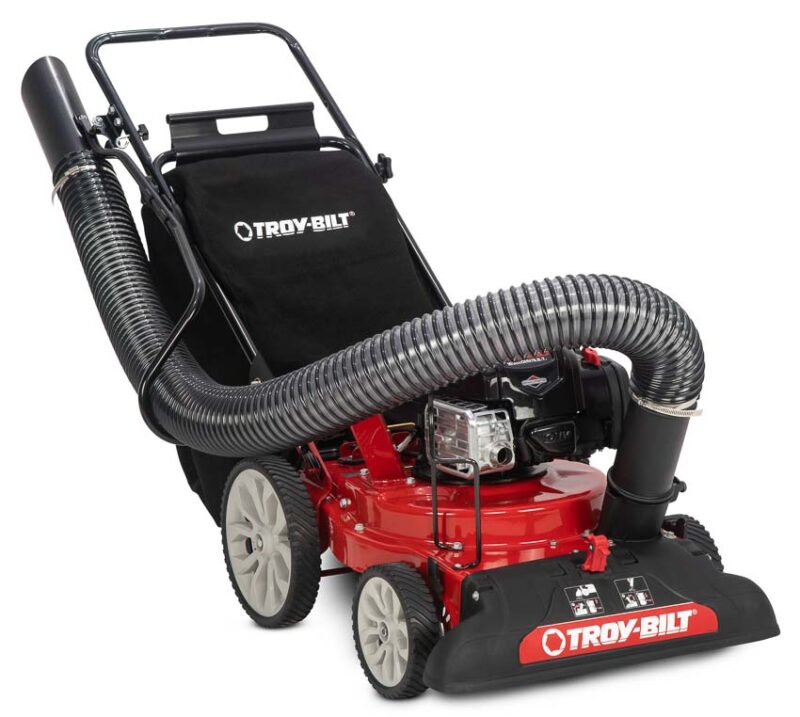
Troy-Bilt’s ability to gobble up a broad swath of leaves coupled with features that let it chew through larger debris make it the ideal choice if you’ve got a lot of ground to clear. Its vacuum measures two feet wide, so you can pick up a lot of leaves with each step you take. While its 8:1 mulch ratio is smaller than some machines, you can still fit a lot inside its 2-bushel size collection bag before you need to change it.
We also like the extension hose, which allows you to get around harder-to-access spots, like leaves caught around landscaping or up against a fence. This vacuum also comes with a chipper chute that can chop up branches up to 1.5 inches in diameter. All these features make this the ideal fall yard clean-up machine for those who live on wooded lots.
Key Features
- Large 2-bushel collection bag
- Doubles as chipper
- Wide vacuum width
- Extension hose
Specifications
- Type: Gas push behind
- Weight: 125 lbs.
- Mulch ratio: 8:1
Price: $799
Best Handheld Leaf Vacuum
Husqvarna 28cc Handheld Mulcher Blower 125BVx
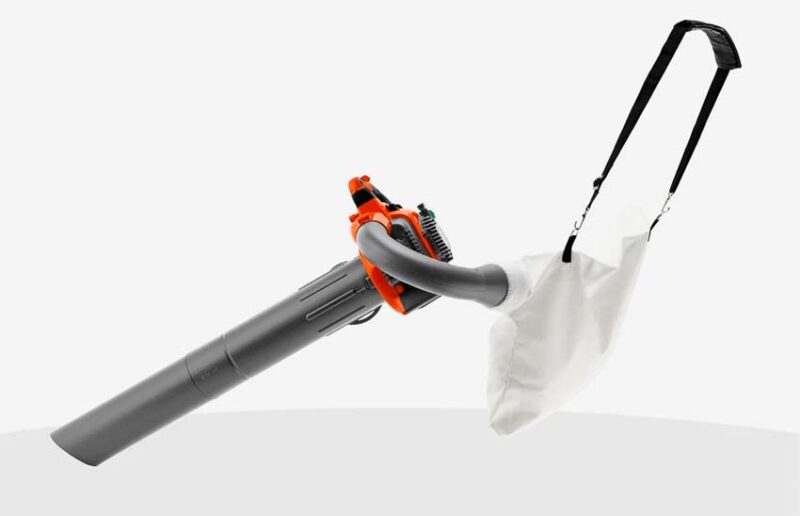
Husqvarna is one of the most well-respected names in yard machines, so it comes as little surprise that its leaf vacuum is one of the best. This combination mulcher blower is powerful and loaded with features that make it easier to use. With its 28cc engine and steel mulching knives, it’s capable of breaking down leaves at a very high 16:1 mulching ratio. The 125BVX is also a powerful blower with an output of 425 CFM air volume and a top speed of 170 mph.
We also like its user-friendly features, including a Smart Start, which makes getting the vacuum up and running easier, a vibration-dampening system that keeps your hand from getting numb over longer jobs, and a variable speed throttle with cruise control. If you’re looking for a Pro-level handheld vacuum and blower, this is the one.
Key Features
- High mulch ratio
- Doubles as blower
- Vibration damping system
- Easy Start technology
Specifications
- Type: Gas handheld
- Weight: 9.6 lbs.
- Mulch ratio: 16:1
Price: $249
Best-Selling Leaf Vacuums
The outdoor power equipment landscape has undergone an incredible expansion in just the last few years. Even brands that traditionally haven’t been in the game have entered the market, meaning that, in addition to our top picks, there are a lot of models to choose from. Here are some best-selling leaf vacuums at leading retailers.
Best-Sellers at Acme Tools
Amazon
Lowe’s
Home Depot
Best Leaf Vacuum Buying Guide
Types of Leaf Vacuums
Leaf vacuums come in handheld models that also include a leaf blower function and walk-behind vacuums that make leaf collection easier by allowing you to skip the leaf-gathering step.
Walk-Behind Leaf Vacuums
This type of unit looks similar to a lawn mower with four wheels and a bar on the back that you use to push the vacuum forward. Instead of trimming grass, it sucks up leaves, breaks them down by chopping them up into small pieces, then deposits them into a bag attached to the back of the machine. Since a walk-behind vacuum lets you skip the raking by allowing you to suck up the leaves where they lay. Some walk-behind vacuums also have a detachable hose that can reach leaves in tight spots, such as up against a fence or around plantings.
Handheld Leaf Vacuums
Handheld leaf vacuums consist of a gas or electric-powered motor that powers an impeller that sucks up leaves through a tube, chops them up into small pieces before depositing them into a bag. Most handheld models double as blowers. This combo allows you to gather the leaves into a pile with the blower function and then switch to vacuum to suck up the leaves.
Tow Behind Leaf Vacuums
This type of leaf vacuum consists of a two-wheeled cart that attaches to a riding lawn mower. As the mower expels leaves from the mowing deck, the leaves are sucked through a tube and shredded in an impeller before being deposited into a large box-shaped container that sits on top of the cart. With their high mulch ratios and ability to collect several hundred gallons of chopped-up leaves in a single load, these expensive machines are designed for yard management professionals.
Power Source
While gas-powered vacuums offer maximum leaf vacuuming power, electric models are more eco-friendly and require less maintenance.
Gas-Powered Leaf Vacuums
Gas engines trump electric motors when it comes to raw power with most yard equipment and leaf vacuums are no exception. Gas-powered leaf vacuums produce more suction and have better leaf-chopping power than electric models and thus they’re less likely to clog. They can also be difficult to start and require more maintenance, including periodic oil changes and air filter cleaning. Before investing in a gas-powered unit, make sure you don’t live in one of the cities, such as Washington D.C. and Naples, Florida, that have banned or are planning to pan gas-powered yard equipment.
Electric & Cordless Leaf Vacuums
Electric leaf vacuums come in both corded and cordless models. Corded models give you the advantage of a constant and unlimited supply of power, but tether you to an extension cord, which limits your range and makes the vacuum awkward to work with. Cordless leaf vacuums run off of a rechargeable lithium-ion battery, freeing you from a power cord. However, they typically have runtimes that max out at 45 minutes before needing a recharge.
Suction Power and Capacity
A leaf vacuum’s suction power is determined by the power of its engine or motor. Expect to get significantly more suction power out of a gas-powered leaf vacuum. A gas engine’s power is determined by the engine’s volume, which is listed in CCs. Most gas engines on handheld leaf vacuums/blowers are around 26ccs while walk-behind vacuums have engines of around 170ccs.
Electric models are limited by the amount of power they can pull from a standard wall outlet or rechargeable battery. Corded electric models have motors that are 10 to 12 amps, the max you can get out of a wall outlet, while most cordless models use a 40-volt rechargeable battery.
Along with engine power, consider how much the leaf blower can collect by looking at the size of the collection bag and the leaf vacuum’s mulch ratio. Collection bags for handheld leaf vacuums are around 1.5 to 2 bushels while tow-behind models can hold several hundred gallons.
When a leaf vacuum sucks up leaves, it shreds them into smaller pieces to make them more compact. How well a leaf vacuum breaks leaves down is called the mulch ratio. The higher the mulch ratio, the more leaves you can fit into the collection bag. The mulch ratio can vary from 8:1 up to 18:1. Unfortunately, identifying a machine’s actual mulch ratio can be a challenge. While many manufacturers list the mulch ratio with the leaf vacuum’s specs, many exaggerate this value.
Noise Level
Just how noisy a leaf vacuum is depends on the type of machine and whether it uses a gas or electric motor. Handheld leaf vacuums that double as blowers are the noisiest, producing around 80 to 90 decibels at a distance of 50 feet. Electric leaf vacuums are significantly quieter, though still somewhat noisy, producing between 65 and 70 decibels at the same distance.
Portability and Storage
When deciding on what type of leaf vacuum to buy, consider how you plan to use it and store it. While push-behind and towable leaf vacuums make leaf collection easy by eliminating the need to gather leaves in a pile first, they’re difficult to transport and take up more space in a garage or shed than a handheld model.
Handheld leaf blowers may not have the leaf-collecting power of walk-behind or towable models, but they are much more compact, making them easy to transport from location to location and store. Their smaller size and long tube also make them ideal for removing leaves from tighter spaces, such as around landscaping, against fences, or behind patio furniture.
Uses of Leaf Vacuums
The most common use for a leaf vacuum is yard clean-up. Leaf vacuums not only suck up leaves, but they also shred them into mulch. Since mulched leaves are more compact, you fit far more of them in yard waste bags than you can full-sized leaves.
Since leaf vacuums by design shred leaves as they collect them, they produce excellent organic matter for mulching or composting. If you’re planning on using your vacuumed leaves for this purpose, look for one with a high mulch ratio. A leaf vacuum with a high mulch ratio will shred the material down into very fine bits that will break down more quickly, making them ideal for compost and mulch.
Along with removing leaves from your yard, a leaf vacuum can also be a handy tool for collecting leaves that end up on your deck or patio, allowing you to suck up leaves that end up behind furniture or stuck up against the house.
Safety Considerations When Using a Leaf Vacuum
While leaf vacuums may not present the dangers that chainsaws, hedge trimmers, and lawnmowers do, they are still potentially dangerous machines.
Protective Gear
As we discussed above, leaf vacuums are noisy machines. Exposure to noise levels over 70 decibels for a prolonged period can damage hearing, according to the Centers for Disease Control (CDC). Since leaf vacuums operate at levels above 70 decibels, you’ll want to wear ear protection when using these machines. Leaf blowers also cause a fair amount of dust and debris to become airborne, so wear safety glasses or goggles while using these machines to protect your eyes.
Reading the Manual
Leaf vacuums often also function as leaf blowers. Converting between these two functions usually requires you to detach and reattach tubes and hoses, a process that exposes the machine’s impeller. Performing these changes correctly is key to ensuring safe use of these yard machines. With that in mind, be sure to carefully follow instructions in the user manual for how to assemble and disassemble a leaf vacuum for its various functions.
Safely unclogging the impeller
Even with your best efforts to avoid wet leaves, acorns, and sticks, you’ll eventually encounter clogs with leaf vacuums. To clear a clog safely, make sure the machine is completely shut down first. For gas models, shut the engine off before attempting to unclog its impeller. If the vacuum is electric-powered, remove the battery or unplug it from the power source.
Children and Pet Safety
While the dangers of outdoor yard equipment such as trimmers, chainsaws, and lawnmowers present to pets and children are obvious, the hazards that leaf vacuums present are less so. Remember that leaf vacuums don’t just suck up materials, they also chop material up into tiny pieces using a steel impeller. With that in mind, make sure pets and kids are at a safe distance when using a leaf vacuum.
Proper Storage and Maintenance
As with any yard machine, proper storage and maintenance is key to ensuring it starts up when you need it and runs smoothly while you’re using it. Gas models generally require more TLC than electric models. Clear out your gas leaf vacuum’s air filter before each use. If you plan on leaving the leaf vacuum idle for more than six weeks, drain the fuel tank and lines or add a fuel stabilizer to the tank before storing it. For cordless electric leaf vacuums, make sure you store the rechargeable batteries in a climate-controlled space if temperatures are going to drop below freezing.
Frequently Asked Questions About Leaf Vacuums
What is the best type of leaf vacuum for my needs?
Choosing the best type of leaf vacuum depends on the size of your leaf-clearing job. If you have a small area to clear a handheld electric or cordless blower should meet your needs. If you have a medium-sized yard or heavier leaf fall to manage, go with a handheld gas blower/vacuum that allows you to blow leaves into a pile then switch modes to vacuum them up for collection. For a larger or heavily wooded yard, you’ll want a push-behind model that makes leaf collection faster by eliminating the need to gather the leaves with a rake or blower first.
Are gas-powered leaf vacuums better than electric ones?
Gas-powered leaf vacuums are certainly more powerful, which makes them better able to grind up dense leaves and even small debris such as twigs and acorns. That said, they are heavier than electric models, more difficult to start, and require more maintenance.
Can I use my leaf vacuum for wet leaves or other debris?
If possible, avoid using your leaf vacuum to pick up wet leaves or other debris such as sticks and twigs. While some gas-powered leaf vacuums are powerful enough to handle wet leaves and even some twigs, many can’t. Attempting to use a leaf vacuum on these materials will usually cause clogs.
Are there any eco-friendly leaf vacuum options available?
There are several eco-friendly leaf vacuum options. As with other yard machines, there are corded and cordless electric models that don’t produce the emissions that gas-powered leaf blowers create. Just keep in mind that, while electric leaf vacuums are easier on the environment, there is a trade-off in power. Electric leaf vacuums won’t perform as well as gas models.
Why You Can Trust Pro Tool Reviews
Ever check out a “review” site and you can’t tell if they actually tested anything or if they’re just “recommending” the Amazon top sellers? That’s not us. We won’t recommend anything unless we’d actually use it ourselves, and we don’t really care who the primary retailer is. It’s all about giving you a legitimate recommendation and our honest opinion of each product.
We’ve been in business since 2008 covering tools, writing reviews, and reporting on industry news in the construction and lawn care industries. Our Pro reviewers work in the trades and have the skills and experience to know whether tools can perform well in the field.
Each year, we bring in and review more than 350 individual products. Our team will put our hands on hundreds of additional tools at media events and trade shows throughout the year.
Pro Tool Reviews consults with innovators in the technology and design of tools to gain a broader grasp of where these products fit and how they work.
We work with more than two dozen professional contractors around the United States who review products for us on real job sites. We consult with them extensively on testing methods, categories, and practical applications.
Our site will provide more than 500 pieces of new content this year absolutely free for our readers. That includes objective evaluations of individual tools and products.
The end result is information you can trust because of the editorial, scientific, and real-world professional experience we collectively utilize each and every time we pick up and test a tool.






